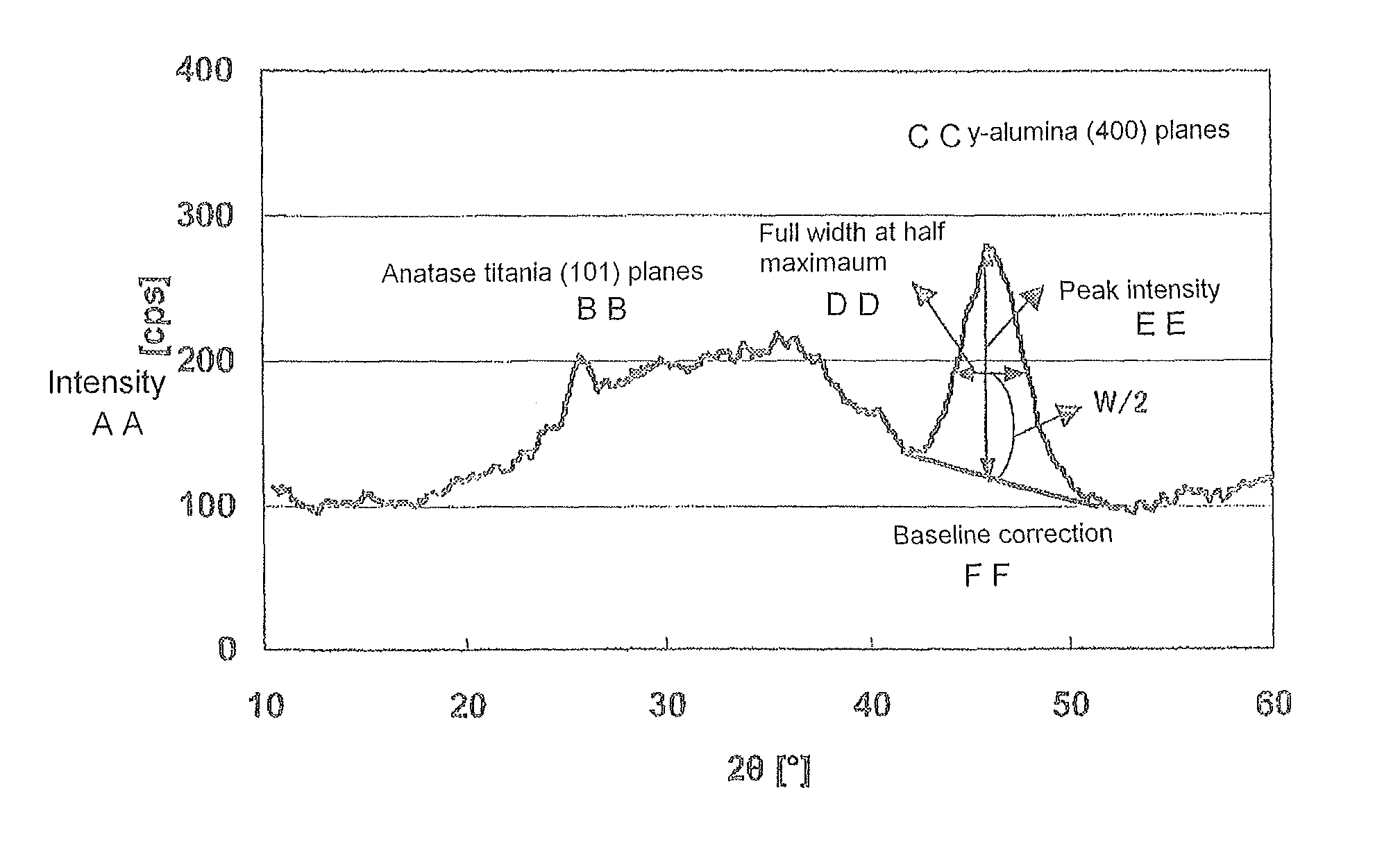Hydrodesulfurization catalyst for hydrocarbon oil, process of producing same and method for hydrorefining
a technology of hydrodesulfurization catalyst and hydrocarbon oil, which is applied in the direction of catalyst activation/preparation, metal/metal-oxide/metal-hydroxide catalyst, physical/chemical process catalyst, etc., can solve the problems of increasing production cost and bulk density, small specific surface area, and low thermal stability, and achieves low cost and high performance. , the effect of high desulfurization activity
- Summary
- Abstract
- Description
- Claims
- Application Information
AI Technical Summary
Benefits of technology
Problems solved by technology
Method used
Image
Examples
examples
[0066]The present invention will be described in more details with reference to the following examples but is not limited thereto.
[0067][Preparation of Hydrodesulfurization Catalyst a]
[0068]Into a 100 L volume tank equipped with a steam jacket were put 8.16 kg of an aqueous solution containing sodium aluminate in an amount of 22 percent by mass on an Al2O3 concentration basis. The solution was diluted with 41 kg of ion-exchange water, to which 1.80 kg of a solution containing sodium silicate in an amount of 5 percent by mass on an SiO2 concentration basis were then added, stirring. The resulting mixture was heated at a temperature of 60° C. thereby preparing a basic aluminum salt aqueous solution. An acidic aluminum salt aqueous solution was prepared by diluting 7.38 kg of an aqueous solution containing aluminum sulfate in an amount of 7 percent by mass on an Al2O3 concentration basis with 13 kg of ion-exchange water while a titanium mineral acid salt aqueous solution was prepared b...
example 2
Preparation of Hydrodesulfurization Catalyst b
[0072]This example is different from Example 1 in that Hydrate Slurry b was prepared by adding at a constant rate to (1) a basic aluminum salt aqueous solution prepared by diluting 8.49 kg of an aqueous solution containing 22 percent by mass on an Al2O3 concentration basis of sodium aluminate with 37 kg of ion-exchanged water and adding thereto, stirring 1.80 kg of a solution containing 5 percent by mass on an SiO2 concentration basis of sodium silicate, followed by heating to a temperature of 60° C. (2) a mixed aqueous solution prepared by mixing an acidic aluminum salt aqueous solution prepared by diluting 10.62 kg of an aqueous solution containing 7 percent by mass on an Al2O3 concentration basis of aluminum sulfate with 19 kg of ion-exchanged water and a titanium mineral acid salt aqueous solution prepared by dissolving 0.91 kg of 33 percent by mass on a TiO2 concentration basis of titanium sulfate in 5 kg of ion-exchanged water, unt...
example 3
Preparation of Hydrodesulfurization Catalyst c
[0076]This example is different from Example 1 in that Hydrate Slurry c was prepared by adding at a constant rate to (1) a basic aluminum salt aqueous solution prepared by diluting 7.82 kg of an aqueous solution containing 22 percent by mass on an Al2O3 concentration basis of sodium aluminate with 44 kg of ion-exchanged water and adding thereto, stirring 1.80 kg of a solution containing 5 percent by mass on an SiO2 concentration basis of sodium silicate, followed by heating to a temperature of 60° C. (2) a mixed aqueous solution prepared by mixing an acidic aluminum salt aqueous solution prepared by diluting 4.14 kg of an aqueous solution containing 7 percent by mass on an Al2O3 concentration basis of aluminum sulfate with 7 kg of ion-exchanged water and a titanium mineral acid salt aqueous solution prepared by dissolving 2.73 kg of 33 percent by mass on a TiO2 concentration basis of titanium sulfate in 15 kg of ion-exchanged water, unti...
PUM
| Property | Measurement | Unit |
|---|---|---|
| pore diameter | aaaaa | aaaaa |
| specific surface area | aaaaa | aaaaa |
| partial pressure | aaaaa | aaaaa |
Abstract
Description
Claims
Application Information
 Login to View More
Login to View More - R&D
- Intellectual Property
- Life Sciences
- Materials
- Tech Scout
- Unparalleled Data Quality
- Higher Quality Content
- 60% Fewer Hallucinations
Browse by: Latest US Patents, China's latest patents, Technical Efficacy Thesaurus, Application Domain, Technology Topic, Popular Technical Reports.
© 2025 PatSnap. All rights reserved.Legal|Privacy policy|Modern Slavery Act Transparency Statement|Sitemap|About US| Contact US: help@patsnap.com

